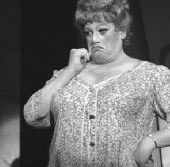HAIRSPRAY
The 5th Avenue, 1308 Fifth, 292-ARTS, $16-$58 7:30 p.m. Sun. and Tues.-Thurs.; 8 p.m. Fri.-Sat.; 2 p.m. matinees Sat.-Sun.; no performance Thurs., June 20 ends Sun., June 23
AFTER THE RECENT decade of atrocious “pop moment”-to-stage musical transformations (terrifying adaptations of Fame, Footloose, Saturday Night Fever, and let’s just back quietly away from that frothing Copacabana over in the corner . . . ), no one had any right to expect that a John Waters film could safely find its way to a genre in which the corn is as high as an elephant’s eye. But Hairspray, which had its world premiere at the 5th Avenue Theatre last week and heads for the Great White Way later in the summer, is the real thing: honest, unprefabricated joy that sends a crowd out remembering a fat girl who trills “this morning life was like a fairy tale/Now I can’t make bail.”
To be fair, Hairspray, the film, is the most accessible of Waters’ trash canon; there is no dog-shit eating, no incestuous blow jobs, none of the singing butt holes of his most notorious work to cloud its happy horizons. There’s just Tracy Turnblad, a perky overweight teen in early ’60s Detroit who dreams of conquering the local TV dance show and spooning with its hunky leading lad (oh, the dance show is segregated, and her mom is a man in a dress, but, you know, it’s all very sweet).
Hairspray, the musical, catches Waters’ irreverent puncturing of white-bread culture and expands on it with a bouncy finesse that punctures the white-bread culture of the American musical itself. Anyone who craves the singular theatrical thrill that only a musical can provide should be hugging themselves until they bleed, but perhaps the show’s sneakiest triumph will be its appeal to those guiltier audience members: people who hate to love musicals and vice versa. The show, Simpsons-style, lampoons the idea of a Broadway tunefest while raising your spirits as a Broadway tunefest.
Tracy (Marissa Jaret Winokur, a bubbling comic dynamo) first appears pinned to a vertical pink bedroom set, belting out “Good Morning Baltimore,” a tone-perfect ’60s girl-group-sounding song in which she confidently maintains that “the rats on the street” seem to say, “Tracy, it’s up to you!” And it’s sprightly, subversive showstopping from there. Despite the initial discouragement of her mother, Edna (Harvey Fierstein, having the most fun he’s had in years), Tracy follows her heart and not only gets a spot on the Corny Collins Show but, due to the friendships with black students that she meets in detention, eventually determines to break the program’s racial barrier. The show’s sponsor, nervous hairspray magnate Harriman F. Spritzer (Joel Vig), becomes concerned about “that chubby Communist girl” and so does the producer, Velma Von Tussle (Linda Hart, doing a fab riff on Cruella De Vil), who doesn’t want the spotlight taken from her daughter, Amber (a sweetly venomous Laura Bell Bundy).
The show so successfully works as it should that you almost don’t want to pick it apart and display its inner workings. From David Rockwell’s loopy, ecstatic, ’60s Warner Bros. cartoon sets to William Ivey Long’s costume flourishes to the candy-colored lighting of Kenneth Posner, the technical production comes together as a seamless whole. Credit first, though, composer Marc Shaiman and his co-lyricist Scott Wittman, whose work is catchy, sometimes acidly funny, and every soaring thing a Broadway song should be. Director Jack O’Brien, fresh off his work on the musicalization of The Full Monty, takes the superlative technical craft and uses it to create a production that unfolds as a series of delirious crescendos. Musical numbers, courtesy of Jerry Mitchell’s choreography and the performers’ obvious delight, hit the ceiling again and again; Corey Reynolds, as Tracy’s new friend Seaweed J. Stubbs, memorably inspires her to “Run and Tell That” in a terrific Motown-ish finger-snapper.
Any complaints? Sure. Fierstein’s famous rasp sometimes descends into an indiscernible garble, and everybody’s vocals are big but not always distinct. The long first act could’ve used a little more of Mark O’Donnell and Thomas Meehan’s clever book and fewer songs. The half- serious/half-joking balancing act the show sustains for most of its length finally falters when the production gives in and hands Seaweed’s mother, Motormouth Maybelle (a rousing Mary Bond Davis), a straight-faced gospel number that may as well have been “You’ll Never Walk Alone.”
None of the above will keep you from the immense enjoyment of the evening. Hairspray has only a few more performances left—now run and tell that.









